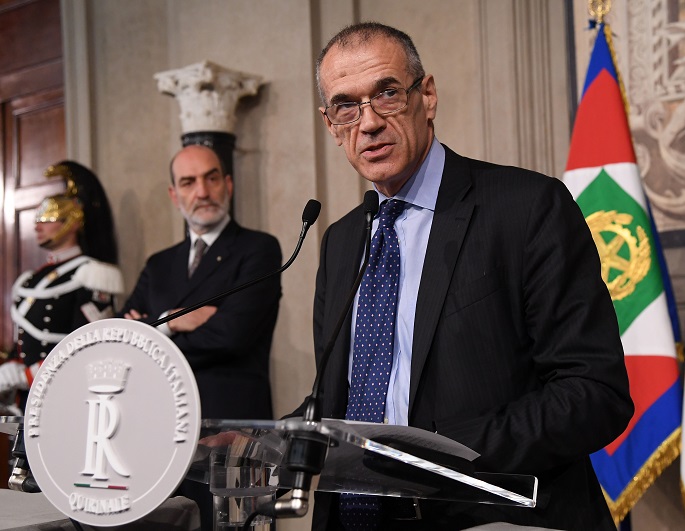Snap elections draw near
Economist Cottarelli named Italy's PM-designate
Published : 28 May 2018, 23:25
With an assertive move to put a temporary end to an 85-day-long stalemate, Italian president Sergio Mattarella on Monday named economist Carlo Cottarelli as Italy's new prime minister-designate.
Cottarelli was summoned and asked to form a technical cabinet able to lead the country to snap elections -- either in late 2018 or early 2019 -- after the efforts by anti-establishment Five Star Movement (M5S) and rightwing League to form a government failed on Sunday.
The crisis was triggered by president Mattarella's refusal to accept their proposal of a Eurosceptic economist as finance minister.
After holding talks with the president for one hour, Cottarelli accepted the mandate, pledging a "cautious approach" to Italy's public finances as caretaker prime minister.
Cottarelli was expected to choose technical figures for his cabinet, which must win confidence votes in both houses of the parliament.
"My plan is to submit a program that -- in case of confidence -- will include the 2019 budget (approval), immediately followed by dissolution of parliament, and new elections in early 2019," he said in a short message from the presidential palace.
His chances to win the confidence were quite low, however, since most parties in parliament said they would not support a technocratic government.
In this case, Cottarelli explained his cabinet would "immediately resign, stay in charge for current affairs only, and accompany the country towards new elections after August."
In either case, snap elections seemed to be approaching.
Italy has been waiting for parties to agree on a coalition government after general elections on March 4 delivered inconclusive results.
The new parliament appeared split in three blocs -- a center-right front as strongest coalition, populist Five Star Movement (M5S) as largest single party, and a center-left coalition at the rear -- none of which were able to form a majority.
Running as rivals in the campaign, M5S and League decided after the vote to join forces on the base of a platform including strong tax cuts, more public spending, a crackdown on irregular migrants, and defiance of European Union (EU) fiscal rules to boost growth.
Their attempt to forge a coalition failed, when the president vetoed their choice for the Finance Ministry.
In a message broadcast on Sunday evening, Mattarella explained he had accepted all of M5S-League's proposals for the cabinet line-up, but could not confirm a finance minister that "would likely, or almost certainly, bring about Italy's exit from the euro-zone."
The two parties had submitted the name of 81-year-old economist Paolo Savona, who has described the single currency as a "European straitjacket" and suggested Italy should leave the euro if "the future of the country is put in jeopardy."
The decision to not confirm the appointment of a minister is a rare step for an Italian president. Nonetheless, it is allowed by constitution, and has occurred at least four times in 1979, 1994, 2001, and 2014.
Yet, it sparked furious reactions by the two populist forces, which appealed on their supporters to organize peaceful street protests in the next days.
M5S's leader Luigi Di Maio called for president Mattarella's impeachment, along with minor far-right party Brothers of Italy. League's leader Matteo Salvini claimed Germany and European financial lobbies were behind the president's veto.
"We are going to have a government that has not been voted by people, not by the parliament, and this is a shameful unique case," Di Maio also said in a message on Facebook on Monday, asking sympathizers to take to the streets of Rome on June 2, Italy's Republic Day.
Both parties also increased their anti-European rhetoric, after Cottarelli was named.
On his part, 64-year-old Cottarelli -- a former IMF Fiscal Affairs Department Director from 2008 to 2013 -- vowed to keep Italy's public finances under control.
He stressed the Italian economy was solid, trying to reassure international investors alarmed by the long uncertainty and the perspective of euro-sceptic forces leading the euro-zone's third largest economy.
He further pointed out that Italy should maintain a constructive approach with the European Union (EU).
"Dialogue with Europe to preserve our national interests is crucial. Yet, as one of the EU funding members, our role in the Union, and our participation in the euro-zone remain essential," he said.


